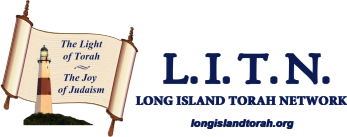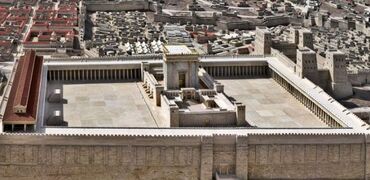Acharei Mos-Kedoshim
Parshas Acharei Mos begins with the laws of the Temple service for Yom Kippur. On this special day, G-d promises to forgive our sins if we repent sincerely. He erases our past misdeeds, and enables the world to endure by cleansing it of the damaging effects of sin. An essential part of the mystery of this day is the special Temple service, which can be performed only by the Kohen Gadol (High Priest). The Kohen Gadol would enter the Holy of Holies - the innermost chamber of the Temple, which contained the Ark of the Covenant - four times on Yom Kippur. The Torah warns that even the High Priest may not enter this sacred chamber at any other time.
In the absence of the Temple, our Sages teach us that our prayers take the place of the Temple service. In addition, studying the laws of the service and yearning for their return act provide some of the merit of the service itself.
The Parsha concludes with a listing of forbidden relationships, such as adultery and incest. The Torah exhorts the Jews to avoid the depraved practices of the Egyptians - whose land they have just left - and the Canaanites - whom they will encounter in the Promised Land. The Land will not tolerate immorality; by maintaining a life of holiness and purity, we will be able to live and prosper there.
Kedoshim means “Holy [individuals].” “Be holy people,” commands God, “for I am holy.” The Torah commands us to live lives of purity and refinement.
The Parsha enumerates a variety of specific laws. Positive Mitzvos mentioned include:
In the absence of the Temple, our Sages teach us that our prayers take the place of the Temple service. In addition, studying the laws of the service and yearning for their return act provide some of the merit of the service itself.
The Parsha concludes with a listing of forbidden relationships, such as adultery and incest. The Torah exhorts the Jews to avoid the depraved practices of the Egyptians - whose land they have just left - and the Canaanites - whom they will encounter in the Promised Land. The Land will not tolerate immorality; by maintaining a life of holiness and purity, we will be able to live and prosper there.
Kedoshim means “Holy [individuals].” “Be holy people,” commands God, “for I am holy.” The Torah commands us to live lives of purity and refinement.
The Parsha enumerates a variety of specific laws. Positive Mitzvos mentioned include:
- Revering parents.
- Observing the Sabbath.
- Leaving gifts for the poor when harvesting one’s field.
- Loving one’s fellow as oneself.
- Standing up and showing respect for the elderly and the wise.
- Treating converts with compassion and sensitivity.
- Judging fairly and honestly; maintaining accurate weights and measures.
- Stealing,
- swearing falsely,
- withholding laborers’ wages,
- cursing another person
- “placing a stumbling block before the blind” –misleading others, either by offering bad advice or by causing them to sin.
- Tale-bearing – sharing negative or harmful information about another person with no constructive purpose – even if the information is true.
- Standing idly by when someone is in danger.
- Secretly hating another. Articulate your grievance, commands the Torah, so the other person can address it.
- Taking revenge or bearing a grudge.
- Cross-breeding animals or crops
- Wearing a garment containing both wool and linen [“Shatnez”].
- Eating fruit from a tree within the first four years of planting. Biblically, this law only applies in the Holy Land, but Rabbinic injunction extends it elsewhere as well.
- Cutting off one’s sideburns [Peyos]; shaving one’s beard with a razor. [These laws apply only to men].
- Idolatry, witchcraft and divination.
- Incest and adultery.


